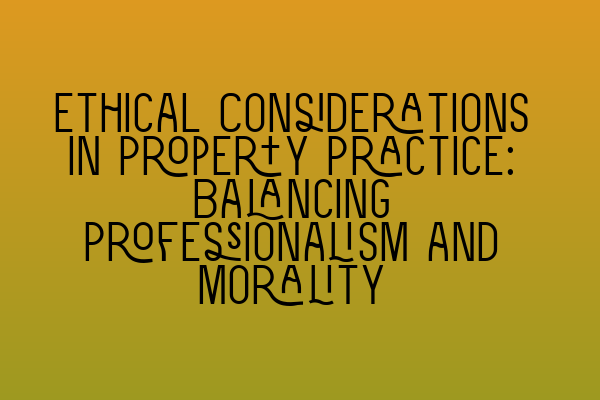Ethical Considerations in Property Practice: Balancing Professionalism and Morality
In the world of property law, professionals are often faced with ethical dilemmas that require them to balance their professionalism with their moral obligations. This delicate balance is crucial to maintaining the integrity of the legal profession and ensuring that justice is served in property transactions. In this article, we will explore some of the key ethical considerations that property practitioners should keep in mind while navigating complex legal matters.
The Duty of Confidentiality
Confidentiality is a fundamental aspect of the solicitor-client relationship. Property practitioners are privy to sensitive information about their clients’ affairs and must uphold strict confidentiality standards. This duty extends beyond the professional relationship and should be maintained even after the engagement has ended. Upholding confidentiality not only ensures client trust but also protects their interests and assists them in making well-informed decisions.
However, there may be instances where the duty of confidentiality conflicts with an attorney’s moral compass. For example, if a property practitioner uncovers information that suggests their client is involved in illegal activities, they may face a substantial ethical dilemma. While the duty of confidentiality must be respected, attorneys are also obligated to uphold the rule of law and prevent harm to others. In such cases, seeking legal advice and guidance can help strike a balance between professionalism and morality.
Conflicts of Interest
Property practitioners often find themselves dealing with multiple clients or parties involved in the same transaction. This can lead to conflicts of interest, especially if the interests of the clients or parties diverge. In such situations, property practitioners must prioritize the interests of their clients and avoid any actions that could compromise their fiduciary duties.
To manage conflicts of interest effectively, property practitioners should maintain clear communication channels with their clients and obtain informed consent when acting for multiple parties in a transaction. Additionally, disclosing potential conflicts of interest to all relevant parties and seeking independent legal advice, if required, can help mitigate ethical concerns.
The Duty of Honesty and Integrity
Being honest and maintaining integrity is paramount for property practitioners. Clients rely on their solicitors’ expertise and expect accurate and truthful advice. By providing honest and unbiased guidance, professionals can build trust, enhance their reputation, and ensure the best possible outcomes for their clients.
While the duty of honesty and integrity may seem straightforward, practitioners can face dilemmas when dealing with conflicting interests. For example, when acting on behalf of a buyer, the practitioner may discover undisclosed defects in the property being purchased. In such cases, they may need to balance their obligation to inform the client with their duty of confidentiality owed to the seller. Taking appropriate legal steps and seeking counsel when faced with such ethical challenges can help property practitioners manage these situations with professionalism and morality.
The Impact on Third Parties
Property transactions often have a significant impact on third parties, such as tenants, neighboring property owners, and the environment. Property practitioners should consider the potential social, economic, and environmental consequences of their actions and ensure that their work promotes fairness, justice, and sustainability.
For example, when advising property developers, practitioners should encourage adherence to planning regulations, environmental standards, and fair housing practices. By actively considering the interests of third parties and advocating for responsible property practices, professionals can contribute positively to society and serve as ethical role models within the legal profession.
Ethical considerations in property practice are essential for maintaining professionalism and promoting the fair and just operation of the legal system. By adhering to a strong moral compass and seeking guidance when faced with ethical dilemmas, property practitioners can cultivate a reputation for integrity and contribute to the ethical advancement of property law.
For more information on SQE (Solicitors Qualifying Examination) preparation courses and exam dates, please visit the following links:
- SQE 1 Practice Exam Questions
- SQE 1 Practice Mocks FLK1 FLK2
- SQE 2 Preparation Courses
- SQE 1 Preparation Courses
- SRA SQE Exam Dates
